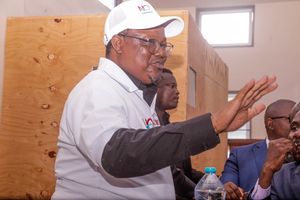Ethiopia rejects UN report on Tigray, terms it 'rubbish' and 'mockery'

Ambassador and Permanent Representative of Ethiopia to the UN Zenebe Kebede (on screen) delivers a speech remotely during an extraordinary meeting on Ethiopia at the United Nations (UN) Human Rights Council in Geneva on December 17, 2021.
What you need to know:
- Authorities in Tigray announced this month they were ready to participate in talks mediated by the African Union (AU), removing an obstacle to negotiations with Abiy's government.
Ethiopia on Tuesday rejected a report by UN investigators that accused Addis Ababa of possible ongoing crimes against humanity in its war-torn Tigray region, including using starvation as a weapon.
The Commission of Human Rights Experts on Ethiopia said it had found evidence of widespread violations by all sides since fighting erupted in Tigray nearly two years ago.
This included the government of Prime Minister Abiy Ahmed, a Nobel laureate, and its allies who were "intentionally causing great suffering" by denying aid to Tigray, a region of six million.
Also Read: There is hope for peace in Ethiopia, UN says
Kaari Betty Murungi, one of the commission's three independent rights experts, and its chair, said the denial of food, medicine and basic services was "having a devastating impact on the civilian population".
"We have reasonable grounds to believe it amounts to a crime against humanity," she said on Monday following the release of the report, the commission's first.
"We also have reasonable grounds to believe that the Federal Government is using starvation as a method of warfare."
Ethiopia's permanent representative to the UN in Geneva, Zenebe Kebede, said the commission was "politically motivated" and their conclusions were "self-contradictory and biased".
"There is not any single evidence that shows the government of Ethiopia used humanitarian aid as an instrument of war," the envoy told AFP, describing the report as "a mockery" and "rubbish".
"Therefore we have no other option but to reject this report."
He said investigators had ignored atrocities by the Tigray People's Liberation Front (TPLF), which ruled Ethiopia for decades before Abiy come to power in 2018, and which Addis Ababa considers a terrorist group.
Fighting between government forces and their allies and rebels led by the TPLF reignited in August after a five-month lull.
The return to the battlefield comes as diplomatic efforts intensify to try and peacefully resolve the nearly two-year war in Africa's second-most populous country.
Authorities in Tigray announced this month they were ready to participate in talks mediated by the African Union (AU), removing an obstacle to negotiations with Abiy's government.
But fighting has only escalated in the weeks since, with air strikes pounding Tigray and Ethiopia's ally Eritrea crossing the border to join the fight against the rebels.
On Tuesday, the TPLF accused Eritrean forces of launching a "full scale offensive" across northern Ethiopia, where heavy combat has been reported on multiple fronts in recent weeks.
AFP was not able to independently verify the claims. Access to northern Ethiopia is severely restricted and Tigray has been under a communications blackout for more than a year.
Mike Hammer, the US special envoy to the region who just returned from 11 days in Ethiopia, said Washington "had been tracking Eritrean troop movements across the border".
"They're extremely concerning and we condemn it," Hammer told reporters on Tuesday.
"The presence of Eritrean troops in Ethiopia only serves to complicate matters, and inflame an already tragic situation."
Eritrean troops supported Ethiopian forces in the early stages of the war when Abiy sent soldiers into Tigray to unseat the TPLF, accusing the group of attacking federal army camps.
Last week, Eritrean authorities issued a general call for mobilisation.





